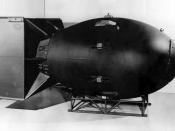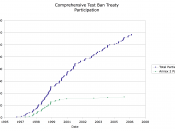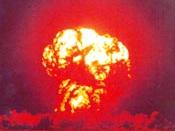The Pros and Cons of the Comprehensive Test Ban Treaty The threat of nuclear warfare and the nuclear arms race has been a huge worldwide issue for the past 60 years. If all out nuclear warfare ever broke out it very possibly could have a result of total world destruction. The United States has been the world leader in preserving world peace and controlling the nuclear arms race. A treaty called the Comprehensive Test Ban Treaty, which has been around for decades but has only recently been signed and ratified by many countries is the main issue. This treaty would ban all nuclear testing explosions around the world (Sanger). There are both pros and cons to the U.S. ratifying the treaty.
The test ban treaty was first ready to be signed by countries in 1996. In this year the United States signed the treaty but it was never ratified.
The issue of ratification came up again in 1999. The treaty has several provisions. The first part to the test ban treaty makes the testing of nuclear weapons illegal all around the world. The second part of the test ban treaty sets up inspection stations around the world to enforce the treaty. The third part of the treaty allows for the use of experiments to test the safety of nuclear warheads to be sure that they are safe. All the testing must be done however, under ground and without explosions to prevent radiation from being released into the atmosphere (Crossette).
There are many reasons it is believed that the United States should ratify the treaty. If the United States ratified the treaty many other leading countries would most likely ratify the treaty also making the world a safer place (Apple). For over fifty years the United States has lead the fight in stopping the spread of nuclear weapons (Sanger). By not signing this treaty everything the United States stood for in those fifty years would be lost according to many people. Many people feel that signing the treaty would be one of the last steps in nuclear arms control (Crossette). Allies believe that as a leading power nation the United States should ratify the treaty in an attempt to halt the spread of nuclear arms (Crossette). Many of the countries that feared the power of the United States may fear the U.S. even more if the U.S. doesn't sign the treaty (Crossette). Adding to that, many of its allies might get the sense that the U.S. isn't as serious about reducing the nuclear arms threat. By signing the treaty it would give nations that want to join the nuclear arms race a message not to. The rejecting of the test ban treaty would be devastating to those who have worked hard to stop the spread of nuclear arms around the world (Dewar). The chance of nuclear war is possibly greater than ever with the rivalry between India and Pakistan. As a world leader, it would be in the best interest of the American population for the United States to ratify this treaty (Alter). Also, not ratifying the treaty would most likely play a negative role in future negotiations with allies who support the treaty (Novak). If the United States doesn't ratify the treaty, any future nuclear wars might be blamed on the U.S. for not supporting the signing of the treaty. The ratification of the test ban treaty would be a giant step for world peace (Stout).
Many people also believe that ratifing the test ban treaty would pose a threat to the national security of the United States. Testing nuclear weapons is the best way to be sure that they are safe and reliable. Therefore not ratifying the treaty would be in the best interest of the United States. Many believe that the test ban treaty is unenforceable and there would be no way of stopping countries like Russia and China from selling nuclear arms to smaller countries like Iran. Ratifying the treaty would only slow the threat of small counties using nuclear weapons and would not totally solve the problem (Alter). The test ban treaty would leave the United States behind in the arms race while countries that cheat get ahead which would greatly affect the United States national security (Schmitt). Ratifying of the treaty would be useless considering most countries would most likely cheat and the treaty would then be invalid (Crossette). If the United States signed the treaty it would make it harder for the U.S. to know whether or not it's own nuclear weapons are reliable and safe (Dewar). There are so many questionable parts to the test ban treaty (Crossette). Some believe the United States should hold off on ratifying the treaty. Many people, including the former President of the United States, Bill Clinton, believe the vote on the test ban treaty should have been postponed until a later date so it could have been more thoroughly examined (Broder). Bill Clinton said in a speech regarding the test ban treaty, "I believe that proceeding to vote under these circumstances would severely harm the national security of the United States, damage our relationship with our allies, and undermine our historic leadership over forty years"ÃÂ (Schmitt). Most other democrats shared these views.
One hundred and Fifty-four nations have singed the treaty along with the United States and other nuclear powerhouse countries such as Britain, China, and Russia. Only twenty-six of the one hundred and fifty-four nations that signed the treaty have ratified it though. In the end result the senate rejected the Comprehensive Test Ban Treaty despite the efforts of Bill Clinton to ratify it (Crossette). I believe The U.S. should have ratified the treaty. The U.S. was the country that wrote the treaty in the first place. If the U.S. ratifies the treaty than many nations would follow in its footsteps. This treaty plays an important role in slowing the race for nuclear arms buildup. Even though there is always going to be a cheating country at least with the ratifying of the test ban treaty the testing would be illegal. Other countries wouldn't approve of that country's action and those countries could team up against it and possibly prevent that country from ever using the weapon.





